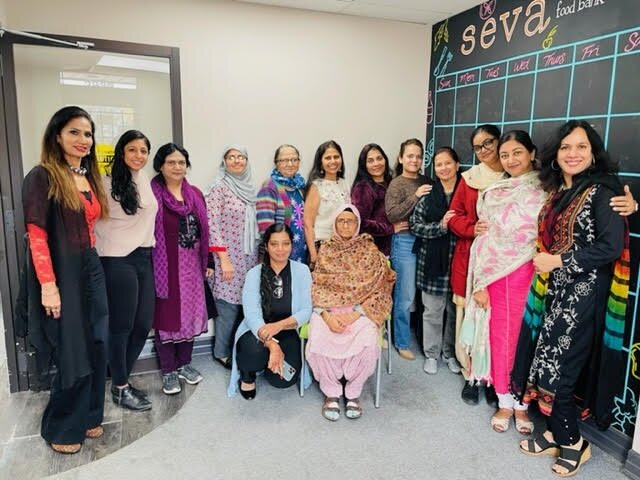Our Bodies Our Voices: Re-Imagining Sexual & Reproductive Justice in ‘Punjabi Canada’
Amrita Kumar-Ratta, Brampton and Mississauga
Project Goals
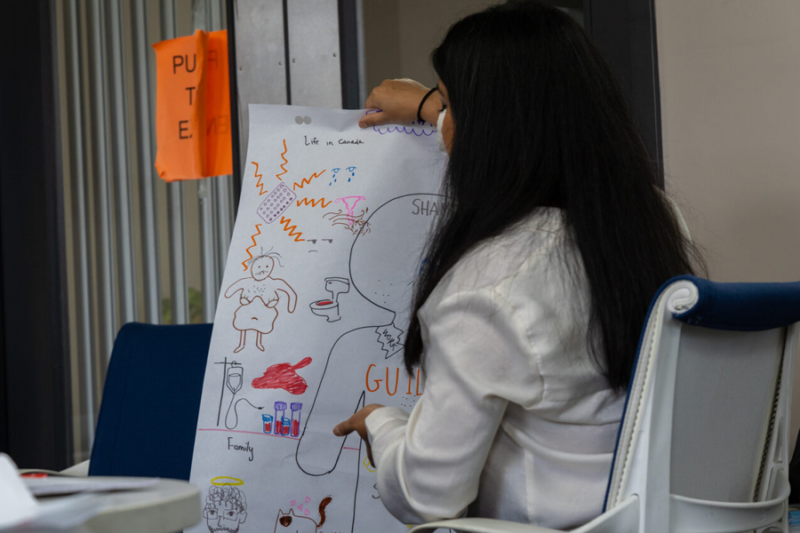
“Many stories are not written on paper, but on the minds and bodies of women” – Amrita Pritam
This project was part of Amrita’s doctoral work at the University of Toronto. Its goal was to create a creative and community-centred storytelling space among multigenerational Punjabi women in Peel Region around the topics of Punjabi femininities, sexual and reproductive violence, and resistance in an effort to “undermine the erasure of… violence” and to see Punjabi women’s scars and stories as markers of resilience, healing, and possibility.
As a Punjabi-identifying woman raised in Peel Region herself, Amrita’s aim was to re-centre the voices of women in her community; to create space for joy and desire at the same time as bearing witness to violence; and to amplify written, oral, and visual storytelling as important forms of ‘felt knowledge’ within Punjabi communities.
Highlights, Successes, Challenges
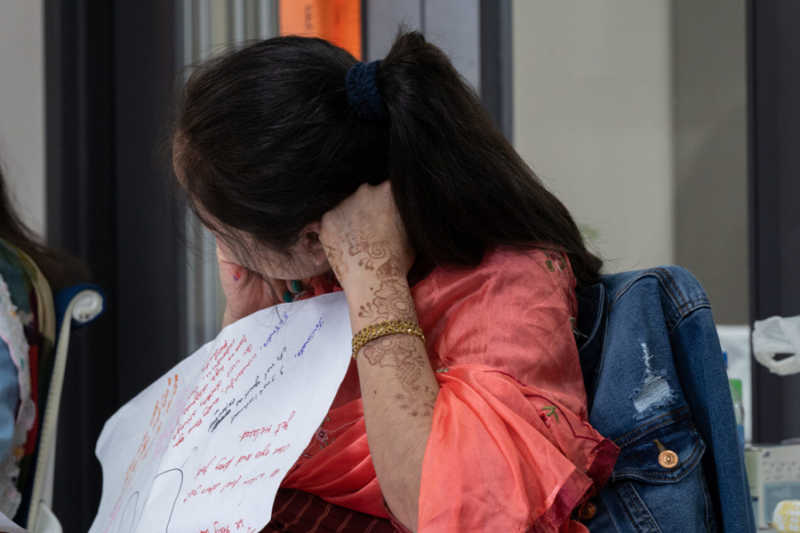
“We are kept from each other by the system, by being told to keep these stories to ourselves and never share our pain because it is shameful, and we should feel guilty. But it felt nice to put the guilt and shame aside for a moment and just be able to finally look around and scream out and be heard.” Workshop Participant
Amrita facilitated three day-long multigenerational storytelling workshops for Punjabi women in Malton Ontario, at the border of Brampton and Mississauga. She also facilitated a mini-workshop for members of a local community organization, the Malton Women’s Council. Participants ranged from mature and elder women born in Indian and Pakistani Punjab to adult women born and raised in/around Peel Region (the daughters of Punjab-born parents), to newcomer Punjabi students and professional women. Topics covered in workshops included sexuality, intimacy, marriage, fertility, migration, family relationships, and sexual and reproductive healthcare experiences. Workshops were held at Seva Food Bank, an initiative of Sikhs Serving Canada.
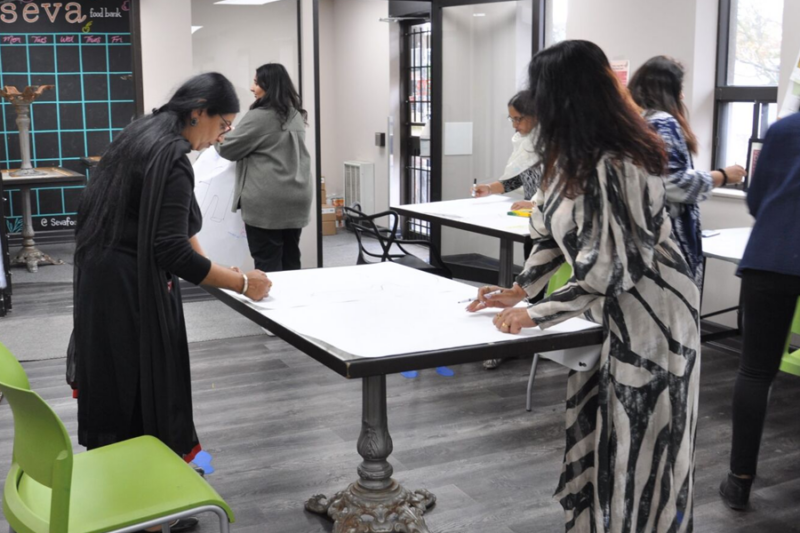
With the support of the University of Toronto’s School of Cities and Oxfam Canada, the project also found its way to Surrey, British Columbia, where another set of three workshops were held with Punjabi women at Solid State Community Industries, a cooperative for BIPOC young entrepreneurs located in the heart of Surrey.
Throughout the year, across both locations, Amrita also conducted one-on-one interviews with Punjabi women who could not participate in workshops due to time, resources, or geographical constraints.
The Ontario portion of this project engaged a total of 38 women (30 workshop participants, eight interviewees) of diverse ages and experiences related to sexual and reproductive health, well-being, and decision-making. All workshops had Punjabi-speaking counsellors, photographers, translators, and note-takers taking part as well.
Workshops were powerful spaces of storytelling and community-building. Many women communicated that they wished the sessions were longer. They said things like, “I felt like we could have gone on forever” and “the generosity and love from all the women were truly liberating”.
While participant recruitment was challenging at the beginning of the project, through partnerships with local organizations and through Amrita’s network of storytellers, creatives, research professionals, and community builders, she had at least 4 people in each session, and she was also able to conduct interviews with those who could not participate in workshops. This meant that women could share their stories in more intimate and accessible ways.
Lessons Learned & Next Steps
“Listening to all those stories expanded my sense of self. It was as if all those stories lived inside me now… I felt their pain but also their wisdom” – Valarie Kaur, See No Stranger: A Manifesto of Revolutionary Love.
Through this project, Amrita has learned that creative and community-centred storytelling space on difficult and taboo topics like sexual and reproductive health is much needed – and deeply desired – by Punjabi women in Peel Region. She has also learned about the importance of being flexible to changing plans, about perseverance in the face of obstacles, and, most significantly, she has witnessed the magic that can happen when you trust in and open yourself up to the love and support of the community around you. “I truly feel transformed – I’ve learnt so much about myself from everyone who has opened their hearts to me,” she says.
For the next year, Amrita has been awarded the Critical Digital Humanities Fellowship at the University of Toronto. As part of this fellowship, she hopes to curate a multimedia story exhibit that will display creative writing and body maps from workshops and select interviews as well as audio and video clips documenting her approach to exploring the ‘living archives’ of Punjabi women’s sexual and reproductive experiences. She has also started working with Planned Parenthood Toronto and the Women’s Health Research Institute in BC to identify ways in which the stories she has collected can inform program/policy development and new research directions.
About Amrita
Amrita Kumar-Ratta (she/her) is a writer, storyteller, social researcher, educator, and community curator. Her work is rooted in principles of decolonial, transnational, and intersectional feminism and transformative justice. Her areas of interdisciplinary knowledge and practice include gender, sexuality, and health; justice, equity, and inclusion (JEDI) strategy; community engagement; and transformative arts education.
She is currently pursuing a PhD in Human Geography at the University of Toronto. Her research explores, unpacks, and gives voice to the sexual & reproductive lives, experiences, and justice work of Punjabi women in Peel Region in Ontario and the Lower Mainland Region in British Columbia.
She is also the Founder & Creator of Shades of Brown Girl, a global creative storytelling and community healing space for South Asian women and femmes.
#socialinclusion #civicengagement #women
Instagram: @amritakumarr @shadesofbrowngirl Twitter: @i_amrita_
LinkedIn: www.linkedin.com/in/amritakumarratta
Centring Race, Gender, and Disability in Active Transportation
Armi De Francia, Ajax
Project Description & Goals
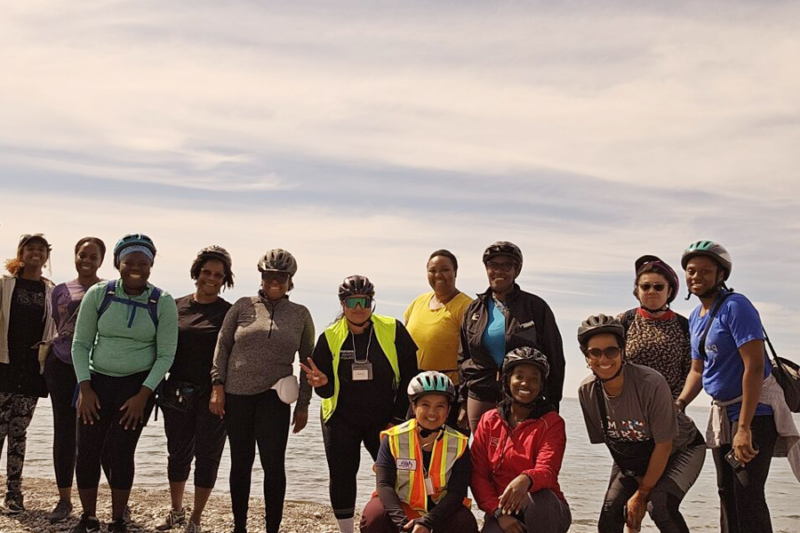
Photo credit: Gyaldam Cycling
Armi De Francia worked to increase representation of women of colour and people with disabilities in active transportation (AT). When mentioning women of colour, she refers to Black, Indigenous, and people of colour who identify as women, including trans women, non-binary, genderqueer, and genderfluid people.
Her goal was to build capacity and encourage AT among women of colour and people with disabilities.
Project Highlights
To achieve this goal, Armi focused on two main activities.
1. Women of Colour Bike Ride
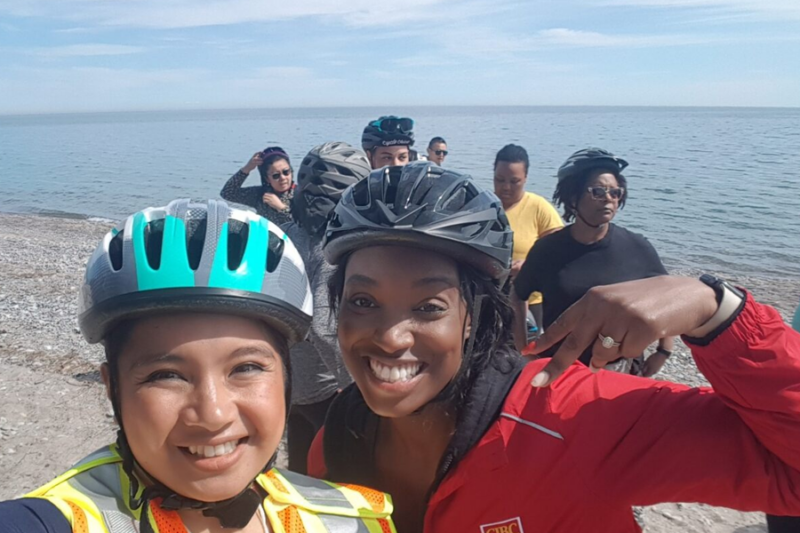
In collaboration with Women of Colour Durham Collective (WOCDC), BikePOC, and Gyaldem Cycling the Changemaker organized a social ride for women of colour of all fitness levels to explore Ajax by bike. The event also welcomed friends and family of different identities.
Twenty women joined along a 7.3 km ride through the Greenbelt and Waterfront Trails.
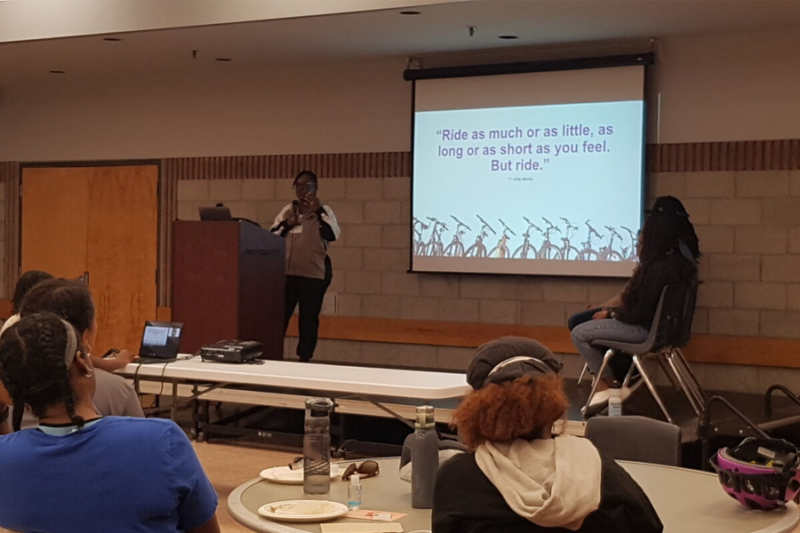
WOCDC curated a post-ride social with inspiring presentations of current research and newly emerged movements overcoming social isolation during the pandemic.
Shilpa Dogra from Ontario Tech University discussed her equity in AT research project and collaboration with Durham Region and local municipalities for more inclusive engagement. Mercedez Brown from Black Queens Ride in Durham shared many motivational bike quotations. Kezia Amoaka and Malcolm Edwards shared about how their roller-skating community they built became spaces of joy and healing.
These energizing presentations revealed the power of community leadership and the need for academia and decision-makers to collaborate with this leadership.
2. Driver Awareness Campaign Centring Pedestrians with Disabilities
Armi coordinated a campaign emphasizing the importance of safer intersections for people with disabilities to explore and connect to their neighbourhood. The Town of Ajax launched the campaign in early Fall 2023.
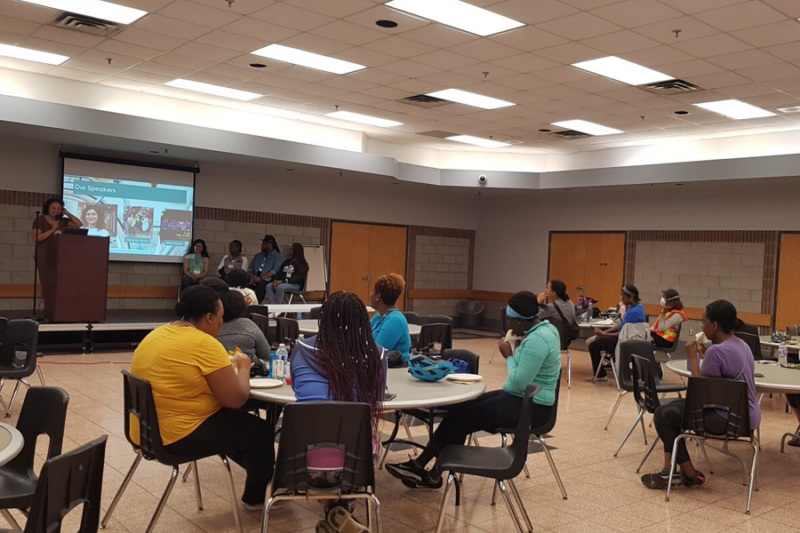
The speakers are Ray Smith and Heather Steeves, a member and former member of the Ajax Accessibility Committee; Fiona, a young adult daughter of Ajax residents who is deaf; and Sarah Colbeck, the Executive Director of the Durham Deaf Services. Two of them are also drivers.
Their key messages to drivers: watch for pedestrians and be mindful that people with disabilities need more time to cross. People who are blind cannot look at drivers and require more time to listen to their surroundings, especially in locations without accessible pedestrian signals. People who are deaf (a lesser visible disability) need to look multiple times before crossing. And people using mobility scooters may need time to find the curb cut.
Capturing the attention of the Town of Ajax staff and Council, the bike ride and campaign were reflected in Action 3.1 of the Strategic Plan: the #GetAjaxMoving Diversity Campaign.
Further, the 2023 Transportation Demand Management (TDM) Plan contains actions supporting similar initiatives: the Ajax Partnership Fund, an inclusive media library, and bike events targeting underrepresented communities.
Collaborating with community leadership brings energizing and worthwhile experiences to encourage AT in ways that better resonate with residents. Including actions to collaborate with community leadership in municipal plans will enable us to collectively help more people receive the benefits of AT. Let the collaboration continue!
About Armi
Armi grew up in Durham Region during her teenage years. She now serves as the Active Transportation Coordinator in the Town of Ajax. Though not from Ajax, she often bikes to Ajax and is familiar with the challenges of getting around without a vehicle.
#socialinclusion #equity #mobility
Humans of Transit
Bee Zelda, Windsor
Project Description & Goals
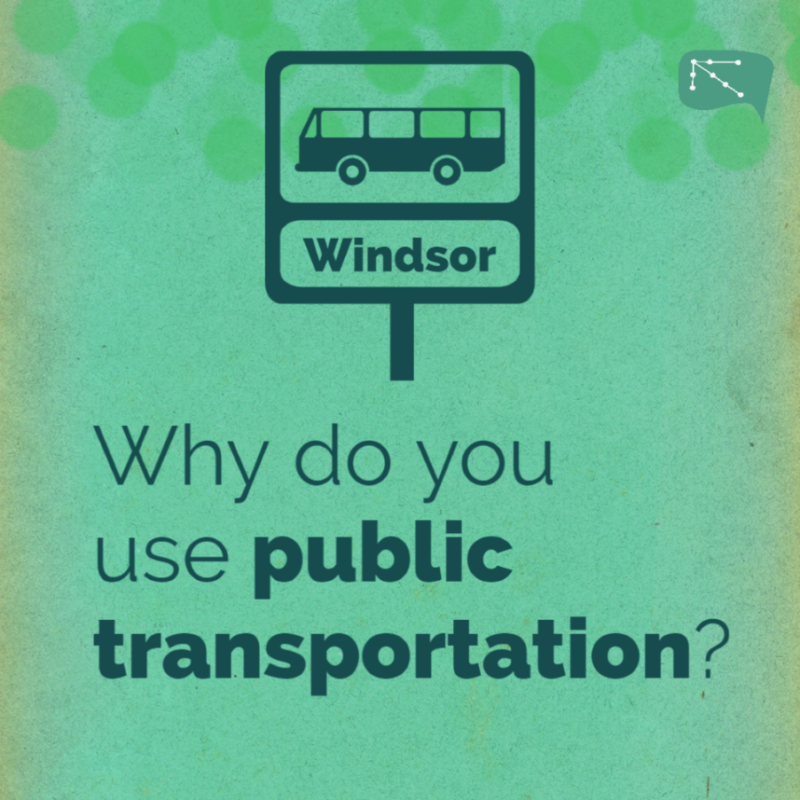
Bee Zelda ( they/them) has continued to work in local advocacy, encouraging safe, diverse, and inclusive spaces while promoting conversations about important topics affecting our city and communities. Their aim was to promote the use of public transit and eliminate the stigma associated with it, so they initiated the Humans of Transit (HoT) project. The main objective of HoT was to encourage constructive discussions about the use of public transportation and to increase its visibility.
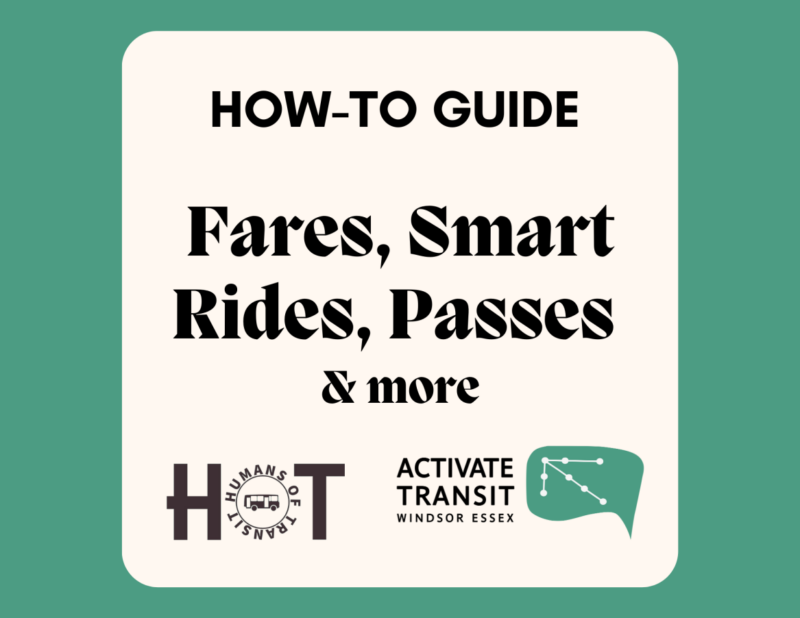
The Changemaker worked to build a sense of community ownership of public transit in Windsor, with an emphasis on accessibility. By showcasing the diversity of transit riders, they wanted to create a more positive and inclusive image of public transit riders, which would ultimately lead to increased usage and a more sustainable future. This comes with celebrations of successes, reflections on challenges, and plans for the future.
Project Highlights
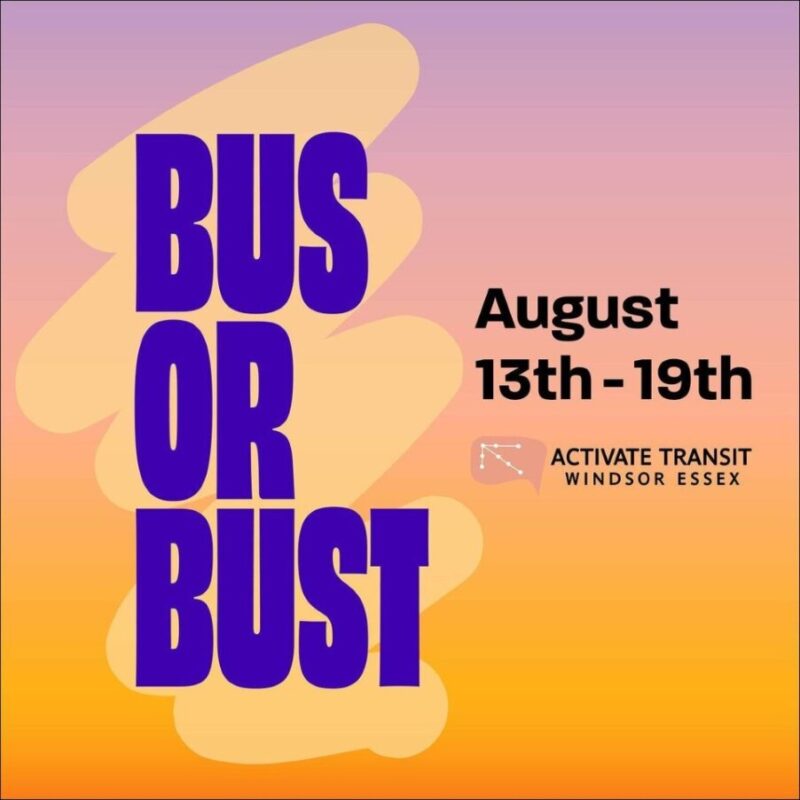
The positive impact of Humans of Transit began with a collaboration with Activate Transit Windsor Essex (ATWE). As a member of the grassroots advocacy group ATWE, it only made sense to use the platform the group had cultivated. Both organizations want to change the way people view public transportation in Windsor, Ontario.

To achieve this, Bee started by making digital and physical infographics for ‘Transit 101’ that are easy to understand and accessible to everyone. They laminated these printouts and took them to hotels where recent refugees were staying, so they could learn to navigate the transit system. Most recently, they launched a social media campaign to encourage non-transit riders to take the bus and share a selfie using #BusOrBust. It has been wonderful working to reduce the stigma and motivate more folks to ride the bus. “Seeing people participate in a transit challenge is amazing’” they say.
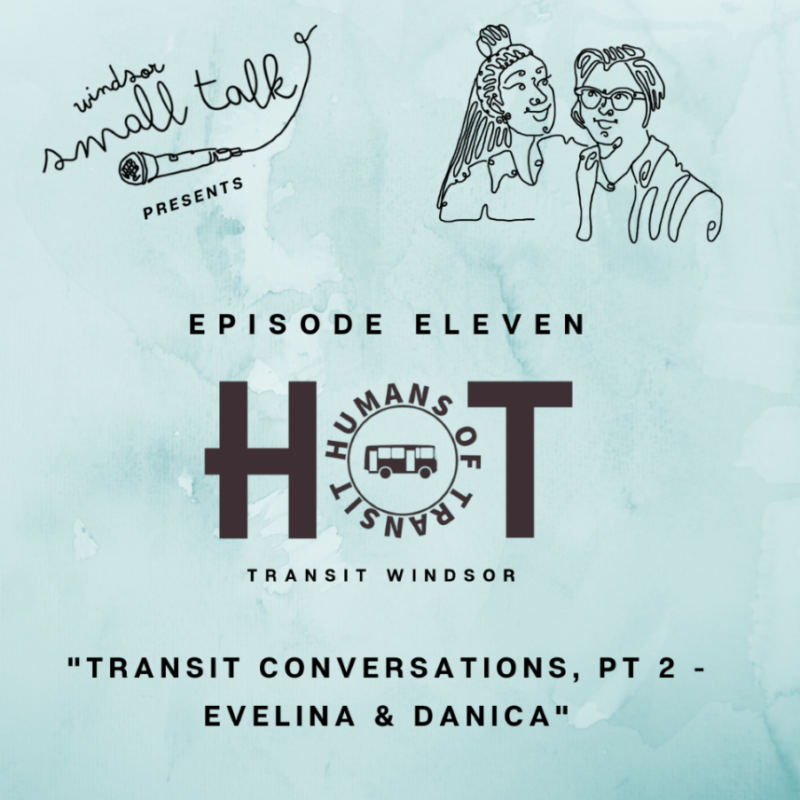
The biggest success for Humans of Transit, however, has been the podcast episodes where Bee Zelda interviewed a variety of people who were willing to share their experiences on transit. Earlier this year, they and their spouse started a podcast called Windsor Small Talk, where they speak to the vibrant and creative individuals of Windsor. This gave them the idea of interviewing transit users to hear their experiences and to showcase that all kinds of people rely on public transit.
Everyone deserves freedom of mobility.
Project Challenges
“I faced some unique challenges. I had to find people who wanted to share their experiences with transit but who still had hope for the future,” mentions the Changemaker. It was important to consider solutions or discuss possibilities for fixing current issues with transit in Windsor while still being vulnerable about our needs and feelings. They are proud to have captured both the struggles and hopeful prospects for the Humans of Transit segment on the podcast.
By sharing stories, we can humanize the experience of being a transit user.
Next Steps
Bee looks forward to continuing their work with transit in Windsor-Essex, and sharing their Humans of Transit infographics ‘Transit 101’ content for everyone to use. The segment for Humans of Transit on their podcast will continue because it is still important for folks to share their experiences while using this platform to continue to encourage accessibility, safety, and frequency to accommodate everyone. Humans of Transit will continue to be a collaborative partner with ATWE and their advocacy.
Humans of Transit is a project that celebrates transit and its users as a vital part of a sustainable city. Setbacks will always be a part of the grassroots advocacy journey, but the Changemaker is proud to be hopeful about the progress they’ve made and where they aim to be in the future.
About Bee
Bee Zelda, they/them, is passionate about encouraging safe, diverse, and inclusive spaces while promoting conversations about important topics affecting our city and communities.
Links
Podcast Pt 2 Humans of Transit
Podcast Pt 1 Humans of Transit
Podcast Humans of Transit Budget Talks
City Councilor does the bus challenge #BusOrBust
Activate Transit Social: Facebook and Instagram
#socialinclusion #civicengagement #publictransit
